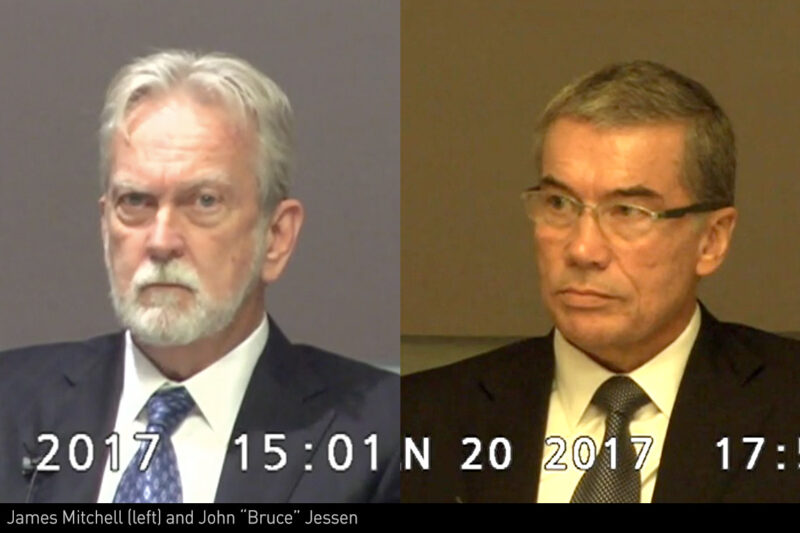CIA Torture Psychologists Compare Themselves to Nazi Poison Gas Manufacturer as Defense


As the recently departed White House press secretary demonstrated earlier this year, making comparisons to the Nazi regime’s murderous use of poison gas is rarely a good idea. That’s one reason it was so surprising that ahead of a crucial court hearing this week, defense lawyers for the two psychologists behind the CIA’s torture program compared their clients to the contractors who supplied the Nazis with Zyklon B, the poison gas used at Auschwitz and other concentration camps to murder millions of Jews and other prisoners in the Holocaust.
Psychologists James Mitchell and John “Bruce” Jessen were the architects of the CIA’s torture program. Now, in a groundbreaking lawsuit, three survivors and victims of the torture program are seeking to hold Mitchell and Jessen accountable.
This Friday in federal court in Spokane, Washington, Mitchell and Jessen’s lawyers will argue that they can’t be held responsible for their actions. In an extraordinary legal filing, Mitchell and Jessen claim they aren’t legally responsible to the people hurt by their methods because they “simply did business with the CIA pursuant to their contracts.”
A key part of Mitchell and Jessen’s argument hinges on the claim that poison gas manufacturers weren’t held responsible by a British military tribunal for providing the Nazis with the gas because the Nazi government, not contractors, had final say on whether to use it. They argue that they are like a corporate gassing technician who was charged with and acquitted of assisting the Nazis because “even if [Mitchell and Jessen] played an integral part of the supply and use of” torture methods, they had no “influence” over the CIA’s decision to use them and can’t be accountable.
In fact, the Nuremberg tribunals that judged the Nazis and their enablers after World War II established the opposite rule: Private contractors are accountable when they choose to provide unlawful means for and profit from war crimes. In the same case that Mitchell and Jessen cite, the military tribunal found the owner of a chemical company that sold Zyklon B to the Nazis guilty — even though only the Nazis had final say on which prisoners would be gassed.
The military tribunal made clear that “knowingly to supply a commodity to a branch of the State which was using that commodity for the mass extermination of Allied civilian nationals was a war crime, and that the people who did it were war criminals for putting the means to commit the crime into the hands of those who actually carried it out.”
This conclusion applies in our clients’ case, as we explained in a court filing. Mitchell and Jessen came up with the torture methods used at secret CIA prisons, personally tested their methods on the CIA’s first prisoner, and formed a company that took in $81 million in taxpayer money to run the torture program. Making money by choosing to supply the tools for torture isn’t “simply doing business.” It’s illegal.
Our clients Suleiman Abdullah Salim, Mohamed Ahmed Ben Soud, and the family of Gul Rahman will be taking a historic step to seek justice from the psychologists. It’s the first time victims of CIA torture have ever made it this far past the many obstacles that doomed previous lawsuits even before they got underway.
Having failed in two previous attempts to shut down the lawsuit against them, Mitchell and Jessen are now also making one last effort to avoid a trial — presently scheduled for early September — for their actions. The two psychologists will argue again that no court has the power to judge them, and that they’re immune from having to account for the profits they made.
But as we’ve previously pointed out, torture isn’t a “political decision” — it’s a war crime. And it is a legal and moral imperative to hold accountable those responsible for torturing in our name.


